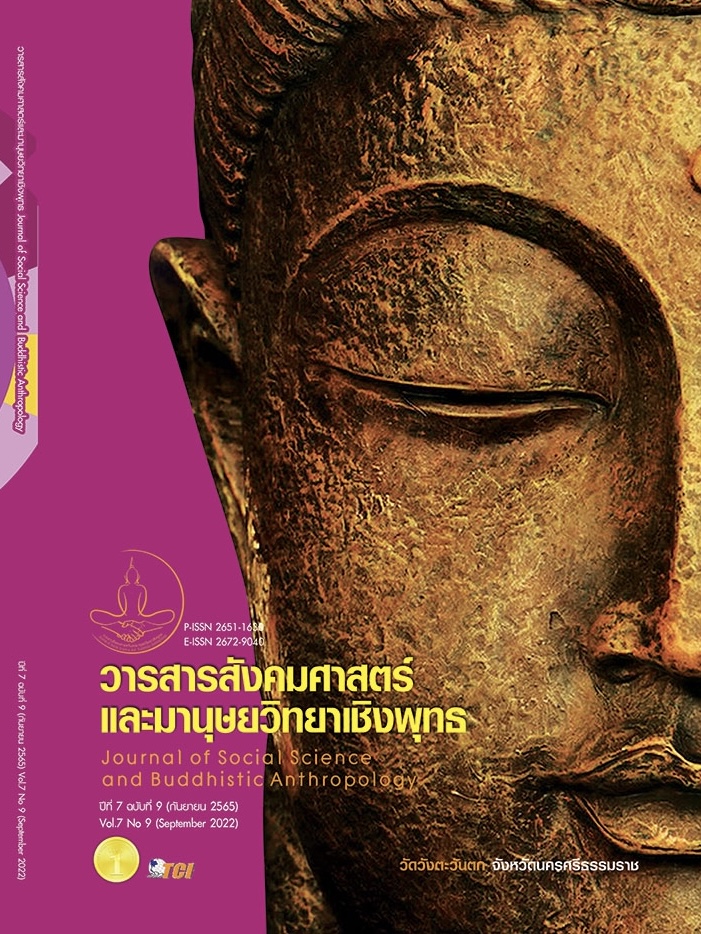STUDYING KNOWLEDGE IN AN ANTI-CORRUPTION BY ACTIVITIES AND BUDDHIST PRINCIPLES IN CHIANG MAI PROVINCE
Keywords:
New knowledge, Anti-corruption, Activities and Buddhist PrinciplesAbstract
The objectives of this research article were to 1) study the knowledge of anti-corruption through activities and Buddhist principles in Chiang Mai area, 2) develop the knowledge in anti-corruption through activities and Buddhist principles, and 3) contribute the knowledge in anti-corruption by using activities and Buddhist principles in Chiang Mai Area. This research model is mixed-method research: quantitative research and qualitative research. The research population group consisted of students, Buddhist scholars, teachers, staff, and administrators with a total of 413 participants. The research instrument were questionnaires, interview forms, and training assessment forms. The results found that 1) a body of knowledge in anti-corruption by using activities and Buddhist principles for solving the problem of preventing fraud activities by creating a body of knowledge in the law and the clarity of the jurisprudence process, complaint adjustment, or various problems; 2) developing a body of knowledge in anti-corruption, grooming quality officers with legal training related to the controlling of corruption and misconduct so that the personnel's theoretical knowledge is in the same direction, they believe in the principles and fair and fair performance according to the law; 3) the presentation on anti-corruption found that activities to create a body of knowledge in the law and the clarity of the jurisprudence, the process to make a complaint adjustment, or problems that arise in society to adjust a good attitude towards the legal process, strengthening the network and continuing to be organized in conjunction with teaching and learning in the classroom or in related courses.
References
กรองกาญจน์ วิวัฒน์วิศวกร. (2554). ระยะห่างระหว่างโต๊ะสอบ เพื่อป้องกันการทุจริตโดยใช้การแลกเปลี่ยนระหว่างความเร็วกับความแม่นยำ. ใน วิทยานิพนธ์วิศวกรรมศาสตรมหาบัณฑิต สาขาวิชาวิศวกรรมอุตสาหการ. จุฬาลงกรณ์มหาวิทยาลัย.
กรุงเทพธุรกิจ. (2561). 10 ไลฟ์สไตล์ของคนในยคุ Gen Y. เรียกใช้เมื่อ 14 มกราคม 2561 จาก http://www.bangkokbiznews.com/blog/detail/499582
กิตติมา บูชา. (2554). ปัจจัยที่มีความสัมพันธ์กับประสิทธิผลต่อการบริหารงานของสำนักงาน คณะกรรมการป้องกันและปราบปรามการทุจริตแห่งชาติ (ป.ป.ช.). ใน วิทยานิพนธ์บริหารธุรกิจมหาบัณฑิต สาขาวิทยาการจัดการ. มหาวิทยาลัยสุโขทัยธรรมาธิราช.
จินตนา พลอยภัทรภิญโญ. (2554). ปัจจัยเอื้อที่ทำให้เกิดการทุจริตต่อหน้าที่ของบุคลากร สังกัดกระทรวงศึกษาธิการ. ใน ดุษฎีนิพนธ์ปรัชญาดุษฎีบัณฑิต สาขาวิชาการบริหารการศึกษา. มหาวิทยาลัยศิลปากร.
ชุมแพ แสนยะบุตร. (2560). การสร้างความเข้มแข็งให้กับชุมชนและภาคประชาชนต่อต้านการทุจริตขององค์กรชุมชน กรณีศึกษา: ชุมชนในเขตเทศบาลตำบลกลางหมื่น อำเภอเมืองกาฬสินธุ์ จังหวัดกาฬสินธุ์. วารสารมหาวิทยาลัยนครพนม, 7(3), 53-62.
ญาดา กาศยปนันทน์. (2554). การกำหนดมาตรการทางกฎหมายในการตรวจสอบความเคลื่อนไหวทางการเงินของบุคคลที่มีสถานภาพทางการเมืองเพื่อการป้องกันและปราบปรามการทุจริตของไทย. ใน ดุษฎีนิพนธ์นิติศาสตรดุษฎีบัณฑิต สาขาวิชากฎหมายอาญา. มหาวิทยาลัยธรรมศาสตร์.
ณรงค์ โพธิ์พฤกษานันท์. (2551). ระเบียบวิธธีวิจัย. กรุงเทพมหานคร: เอ็กซเปอร์เน็ท.
ภัชราพร มีรสสม. (2555). การบริหารจัดการการศึกษานอกระบบที่มีคุณภาพในประเทศไทย. ใน ดุษฎีนิพนธ์ปรัชญาดุษฎีบัณฑิต สาขาวิชาการจัดการ. มหาวิทยาลัยสยาม.
สำนักงานคณะกรรมการพัฒนาการเศรษฐกิจและสังคมแห่งชาติ. (2560). แผนพัฒนาเศรษฐกิจและสังคมแห่งชาติ ฉบับที่ 12 พ.ศ. 2560 - 2564. กรุงเทพมหานคร: สำนักงานคณะกรรมการพัฒนาการเศรษฐกิจและสังคมแห่งชาติ.
สำนักงานคณะกรรมการพัฒนาการเศรษฐกิจและสังคมแห่งชาติ. (2562). ยุทธศาสตร์ชาติ (20 ปี) พ.ศ. 2561 - 2580. กรุงเทพมหานคร: สำนักงานคณะกรรมการพัฒนาการเศรษฐกิจและสังคมแห่งชาติ.
Ainsworth, R. T. (2011). Technology can solve MTIC fraud – VLN, RTvat, D-VAT certification. European Union: International Vat Monitor, 22(3), 153-160.
Amare, S. (2014). Human resource development practices and challenges in public sector: Evidence from selected regional public bureaus in Tigray regional State, Ethiopia. In Unpublished master’s thesis. Mekelleof University, Mekelle, Ethiopia.
Byrne, S. M. (1999). The value of human resource development to an organization; Providing technical assistance to small manufacturing companies. In Unpublished doctoral dissertation. Virginia Polytechnic Institute and State University.
Richins, L. (2014). Preventing corporate fraud. Salt Lake City: UT: University of Utah.
Waziri, F. (2011). Strengthening of anti corruption commissions and laws in Nigeria. In Unpublished doctoral dissertation. University of Pittsburgh.
Yamane, T. (1973). Statistics: An Introductory Analysis. (3rd ed). New York: Harper and Row Publications.
Downloads
Published
How to Cite
Issue
Section
License

This work is licensed under a Creative Commons Attribution-NonCommercial-NoDerivatives 4.0 International License.









